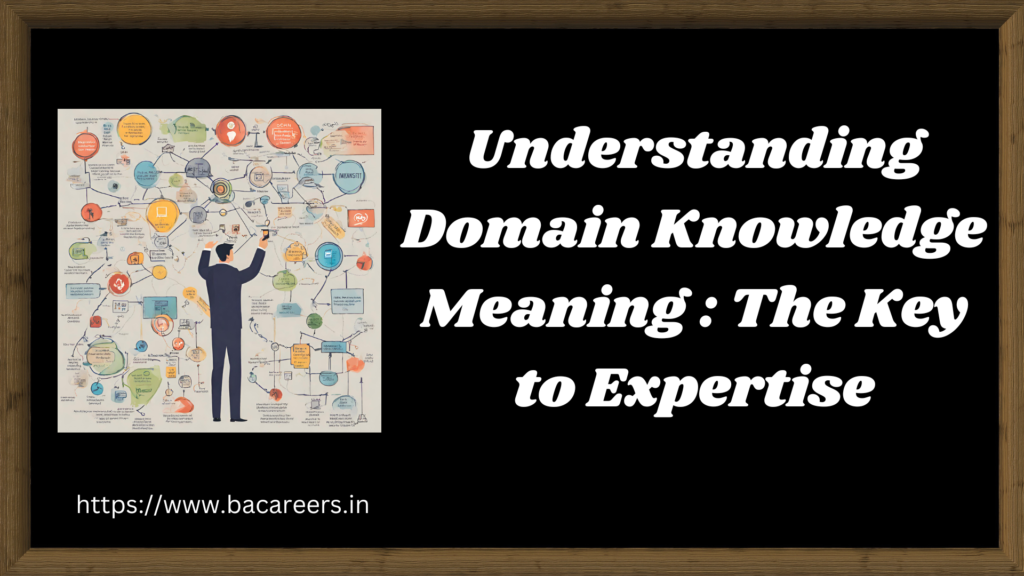Understanding Domain Knowledge Meaning : The Key to Expertise
Domain Knowledge Meaning : In any field or profession, the term “domain knowledge meaning” holds significant importance. Whether you’re a software developer, a medical professional, or a marketing strategist, possessing domain knowledge is often considered the cornerstone of expertise. But what exactly does domain knowledge entail, and why is it so crucial? Let’s delve into this fundamental concept.
Domain knowledge refers to a specific area or field of expertise that an individual possesses. It plays a crucial role in developing expertise and mastering a particular subject. By understanding domain knowledge, one can gain deeper insights, make better decisions, and solve complex problems more effectively. Experts in their respective fields often have a profound understanding of domain knowledge, which sets them apart from others. Therefore, acquiring and continuously expanding domain knowledge is essential for anyone looking to excel in their field and become an expert in their chosen domain.
Defining Domain Knowledge
At its core, domain knowledge refers to expertise or understanding within a specific subject area, industry, or field of study. It encompasses a deep comprehension of the concepts, terminology, practices, trends, challenges, and opportunities relevant to that particular domain. Essentially, it’s the specialized knowledge that individuals acquire through education, training, and hands-on experience within their respective fields.
Examples of Domain Knowledge
Domain knowledge can vary widely depending on the context. Here are a few examples to illustrate its diversity:
- Medicine: Healthcare professionals possess domain knowledge in areas such as anatomy, physiology, pharmacology, and medical procedures. They understand the intricacies of diagnosing illnesses, administering treatments, and interpreting patient data within the healthcare domain.
- Finance: Professionals in the finance industry have domain knowledge related to investment strategies, financial markets, risk management, and regulatory compliance. They can analyze economic trends, assess the performance of financial assets, and make informed decisions to maximize returns while minimizing risks.
- Engineering: Engineers specialize in various domains such as civil, mechanical, electrical, or software engineering. They possess domain-specific knowledge related to design principles, materials, construction techniques, programming languages, or hardware systems, depending on their area of expertise.
- Education: Educators have domain knowledge in pedagogy, curriculum development, instructional methods, and assessment techniques. They understand how students learn and develop strategies to facilitate effective learning experiences within educational settings.
- Marketing: Marketers possess domain knowledge in consumer behavior, market research, branding, advertising, and digital marketing strategies. They leverage their understanding of target audiences and market dynamics to create compelling campaigns and drive business growth.
The Importance of DomainKnowledge
Domain knowledge is indispensable for several reasons:
- Problem Solving: In any profession, individuals encounter complex challenges that require specialized expertise to solve effectively. Domain knowledge equips professionals with the necessary insights and tools to address these problems efficiently.
- Innovation: Deep understanding of a domain enables professionals to identify gaps, anticipate trends, and develop innovative solutions. Whether it’s creating cutting-edge technology, devising groundbreaking medical treatments, or launching disruptive business ventures, domain knowledge fuels innovation.
- Decision Making: Informed decision making is a hallmark of expertise. Professionals with domain knowledge can evaluate situations, weigh options, and make informed decisions that align with the objectives and requirements of their respective domains.
- Communication: Effective communication is essential for collaboration and knowledge sharing within a domain. Individuals with domain knowledge can articulate ideas, convey information, and engage in meaningful discussions with colleagues, clients, or stakeholders, fostering collaboration and driving progress.
- Continuous Learning: Domain knowledge is not static; it evolves over time due to advancements in technology, changes in regulations, and shifts in market dynamics. Therefore, professionals must engage in continuous learning and stay updated with the latest developments within their domains to maintain their expertise.
Developing Domain Knowledge
Building domain knowledge is a gradual process that requires dedication, curiosity, and perseverance. Here are some strategies to develop expertise within a specific domain:
- Education and Training: Pursue formal education, certifications, or specialized training programs relevant to your field of interest. Acquire foundational knowledge and skills through coursework, workshops, or online learning platforms.
- Hands-on Experience: Gain practical experience by working on real-world projects, internships, or research initiatives within your domain. Practical exposure allows you to apply theoretical knowledge, develop problem-solving skills, and deepen your understanding of domain-specific concepts.
- Networking and Mentorship: Connect with professionals, experts, and mentors within your domain to expand your network and learn from their experiences. Engage in discussions, seek advice, and leverage their insights to accelerate your learning journey.
- Continuous Learning: Stay curious and committed to lifelong learning. Keep abreast of industry trends, research findings, and best practices through reading, attending conferences, participating in webinars, or joining professional associations.
- Reflection and Feedback: Reflect on your experiences, challenges, and successes within your domain. Seek feedback from peers, mentors, or supervisors to gain valuable insights and identify areas for improvement.
In conclusion, domain knowledge is a cornerstone of expertise across various disciplines and industries. It empowers professionals to solve problems, drive innovation, make informed decisions, communicate effectively, and pursue continuous learning. By investing in the development of domain knowledge, individuals can unlock new opportunities, advance their careers, and contribute meaningfully to their respective fields.
Important Article :
What is Domain Knowledge in software industry?
Exploring the Most Important AI Tools Shaping Our Future

Business Analyst , Functional Consultant, Provide Training on Business Analysis and SDLC Methodologies.


After examine a couple of of the weblog posts on your website now, and I truly like your way of blogging. I bookmarked it to my bookmark web site checklist and will be checking again soon. Pls take a look at my site as nicely and let me know what you think.
Your place is valueble for me. Thanks!?